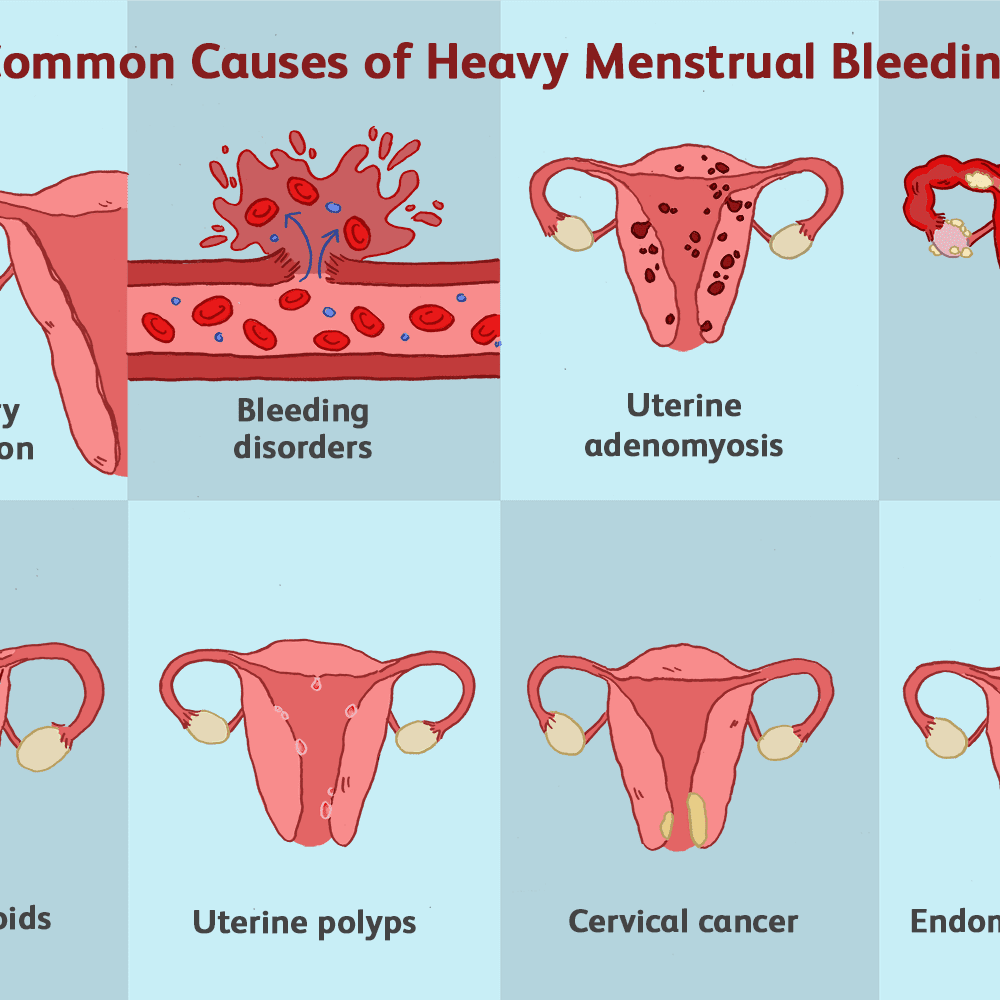How To Stop Heavy Periods
It can be hard to know if you have heavy periods, medically known as menorrhagia. Periods vary so much between women that whats normal for you may be heavy for someone else.
However, as a general rule, you have heavy periods if you experience heavy bleeding or bleeding for more than seven days. Signs that you have heavy bleeding include soaking through your sanitary products in an hour or needing to use more than one at the same time eg a tampon and a pad.
Heavy periods can take an emotional and physical toll on you. Its therefore important to seek help from your GP. If you experience unusually heavy periods for more than a month or two or feel exhausted during your periods, its time to see your GP.
They can help you decide what steps to take to reduce your bleeding and ease any other symptoms. This may include trying home remedies, making dietary changes, taking medication, or in rare cases when all other treatments have failed, surgery.
Medication For Heavy Periods
In addition to dietary changes and home remedies, you can try over-the-counter medication for heavy menstrual bleeding. If these approaches arent helping, you can talk to your GP about prescription medication to lighten periods.
Over-the-counter painkillers
Over-the-counter non-steroidal anti-inflammatory drugs can reduce your period pain and your menstrual bleeding. These drugs include aspirin and ibuprofen.
Birth control pills, patches and rings
These prescription medications use hormones to lighten your periods by thinning the lining of your womb. Most birth control medication is used for 21 days with a seven-day break when you have your period. However, there are also versions that you can take continuously through the month, which can stop your periods altogether.
Common side effects of birth control medication include:
- Bleeding or spotting between periods
Birth control injection
Your doctor or nurse will inject this hormone medication into your arm or buttock once every three months.
Hormonal intrauterine device
A hormonal IUD is a birth control device that is inserted into your womb and releases hormones to prevent you from getting pregnant. It reduces your menstrual bleeding and for some women, stops it altogether. It can work for three to five years before it needs replacing. Copper IUDs work differently and will not reduce menstrual bleeding.
Tranexamic acid and desmopressin
Desmopressin is taken as a nasal spray.
Norethindrone
When To See A Doctor
If your period lasts longer than a week, consider calling a doctor for advice. Depending on your symptoms, they may suggest setting up an in-person appointment for a physical exam.
On the other hand, if you think youre showing symptoms of a rare cause or if youre pregnant, see a doctor immediately.
If you experience severe heavy bleeding and youre soaking through four or more pads and tampons in a 2-hour period, go to an emergency room right away.
Don’t Miss: How To Stop Your Period From Coming Without Pills
After Stopping Birth Control It’s Normal To Miss Your Period As Your Cycle Regulates Itself Again But Sometimes Another Issue Is To Blame Here Are A Few Reasons Why You May Not Be Getting Your Period As Expected
Birth control pills are widely touted as the answer to a pesky irregular cycle. Once you start taking them, voilayou can expect your period during those placebos each month. Doctors sometimes prescribe birth control pills as a way to balance hormones and kick-start your body into a more predictable cycle. What’s more, some studies indicate they can actually boost your fertility, partly because they can decrease your odds of fertility-inhibiting conditions like endometriosis.
But while those same studies indicate that normal menstruation can return soon after stopping birth control, what happens when that’s not the case? We asked experts to weigh in on how birth control pills can affect your monthly cycle and explain the reasons why you might miss periods once you stop taking it.
When To See Your Gp

See your GP if you’re not pregnant you’ve had a negative pregnancy test and you’ve missed more than 3 periods in a row.
If you’re sexually active and you have not taken a pregnancy test, your GP may advise you to take one.
They may also ask you about:
- your medical history
- any emotional issues you’re having
- any recent changes in your weight
- the amount of exercise you do
Your GP may recommend waiting to see whether your periods return on their own. In some cases you may need treatment for your periods to return.
You should also see your GP if your periods stop before you’re 45 or if you’re still bleeding when you’re over 55.
Recommended Reading: Can I Go To The Pool On My Period
Youre Under A Lot Of Stress
The bodys reaction to stress can change the levels of many hormones that cause your period to last longer than necessary, says Dr. Horton.
Stress can cause delayed ovulation, causing your period to start later than expected, which can make your periods longer and heavier than usual, she explains. Identifying and eliminating stressors in your life will help regulate your periods over time. Meditation, getting enough sleep, and regular exercise are also effective ways to manage stress.
How Is Menorrhagia Diagnosed
Diagnosing menorrhagia has two parts: confirming that your bleeding is unusually heavy, and identifying the underlying cause.
For the first part, your doctor will ask you questions about your medical and menstrual histories. For the second part, one or more tests may be used. Examples include:
- A blood test to check hormone levels and look for signs of anemia or clotting issues.
- A Pap test, where cells from your cervix are examined for signs of infection, inflammation or other unusual changes.
- An endometrial biopsy, which involves taking samples from your uterine lining. The samples are looked at to see if any unusual or cancerous cells are present.
- An ultrasound, which uses sound waves to check for dysfunction in the pelvic organs, as well as blood flow issues.
- A sonohysterogram, another kind of ultrasound thats done while your uterus is filled with liquid to get a better look at the uterine lining.
- A hysteroscopy, where a very small, flexible camera is used to examine the uterus for fibroids, polyps and other possible causes of bleeding issues.
You May Like: What Causes Period To Be Late
When Should You See A Healthcare Professional For A Long Menstrual Period
If you have a long period for only one month, theres probably no need to worry. But if you notice a change for two or three cycles, thats the time to seek out your doctor, Thielen says.
Any significant bleeding between periods without an explanation such as a recently placed IUD should be evaluated. And a woman past menopause should have no bleeding at all and so should see her doctor immediately if she does.
Bleeding Between Periods After Sex Or After Menopause
Bleeding between periods can happen when using contraception such as the pill, the injection, implant, and copper or hormone-releasing IUDs.
However, bleeding between periods, after sex, or after menopause can be caused by a number of other things such as infection, an abnormal cervix or uterus lining. It is best to see a doctor or nurse if you experience these symptoms to find out why it is happening.
Also Check: Does State Farm Have A Grace Period
Treatment For Abnormal Uterine Bleeding
Treatment will depend on the cause, but may include:
- medication such as prostaglandin inhibitors, hormone replacement therapy or antibiotics
- dilatation and curettage involving dilation and gentle scraping of the cervix and the lining of the uterus
- change of contraception it may be necessary to explore methods of contraception other than the IUD or hormones
- surgery to remove tumours, polyps or fibroids or to treat ectopic pregnancy
- treatment of underlying disorders such as hypothyroidism or a bleeding disorder
- hysterectomy the removal of the entire uterus is a drastic last resort, generally only considered for treatment of abnormal uterine bleeding when a serious disease, such as cancer, is also present.
Youre Medically Overweight Or Obese
Obesity can affect your menstrual cycle, says Dr. Horton, because larger bodies produce excess estrogen, which can affect how often you have your periods and eventually cause you to stop ovulating regularly. When you stop having periods every month, the lining of the uterus will become thick, and eventually shed, resulting in very heavy and prolonged bleeding.
Losing weight can help you regulate your periods, she says. Your doctor may also prescribe birth control pills or progesterone to help with the prolonged heaving bleeding.
Also Check: How Can You Stop Your Period
You Are Taking Oral Contraceptives
Are you on the pill and notice your period is 2 days late?
Oral contraceptives are pills taken by women to avoid pregnancy. There are different types of COC pill. The most common pills are taken for a 21 day period with a free 7 days period when you may have bleeding.
Newer types of pill, when taken for continuous 84 days, may prevent pregnancy and cause absent period for 4 months.
How do contraceptives work?
They block the effect of both LH and FSH thereby prevent ovulation and period.
What to do?
Inform your doctor for advice about the pills you are taking. If you are on the continuous pills without a free period, then there is no reason to worry.
Our Physicians At Chapel Hill Obgyn Provide An Accurate And Timely Diagnosis

If youre not pregnant, the absence of a period can be stressful. Because there are so many possible causes for amenorrhea, its important that you schedule an appointment with one of our Chapel Hill gynecologists to determine a course of treatment. We can usually schedule an appointment with you that same week.
For more than 40 years, Chapel Hill OBGYN has served women in the Triangle area, sharing the joy of little miracles and supporting them during challenges. Our board-certified physicians and certified nurse midwives bring together the personal experience and convenience of a private practice with the state-of-the-art resources found at larger organizations. To schedule an appointment, please contact us for more information.
Don’t Miss: What Does Global Period Mean In Medical Billing
How Can I Know If My Period Is Too ‘heavy’
It can be difficult to know whether you have normal menstrual bleeding or if your period is too heavy. Your period shouldnt interrupt your daily activities such as going to school or work, nor should it make you feel stressed or anxious. Signs that you may be bleeding too heavily during your period include:
- having to change your tampon or pad every hour
- bleeding or ‘flooding’ which is not contained by a thick pad
- having to change your pad during the night
- bleeding for more than 8 days
- passing clumps of blood bigger than a 50-cent piece
If you are concerned that your period is too heavy, you should speak to your doctor to help you work out the cause of your heavy bleeding and to seek solutions.
Referral To A Specialist
If your GP thinks a medical condition might have caused your periods to stop, they may refer you to a specialist.
Depending on what your GP thinks is causing the problem, you may be referred to:
- a gynaecologist â a specialist in treating conditions affecting the female reproductive system
- an endocrinologist â a specialist in treating hormonal conditions
You may have a gynaecological examination and various tests, including:
- blood tests â to see if you have abnormal levels of certain hormones
- an ultrasound scan, CT scan or MRI scan â to identify any problems with your reproductive system or the pituitary gland in your brain
Also Check: Reasons For Heavy Bleeding During Periods
Are Hormones To Blame
When you get your period, your levels of estrogen and progesterone are low.
In the first 4 or 5 days, your pituitary gland increases output of follicle-stimulating hormone and your ovaries start producing more estrogen.
Between days 5 and 7, estrogen levels typically crest, your pituitary gland releases a surge of luteinizing hormone , and your progesterone levels start to increase.
A shift in hormone levels could create the appearance of a stop-and-start pattern.
Period flow or regularity issues could be affected by a variety of health conditions, including:
- Fibroids, which are abnormal benign growths that develop in or on the uterus.
- Endometriosis, which occurs when endometrial tissue grows outside the uterus.
- Polycystic ovary syndrome , which occurs when the ovaries make large amounts of androgens . Sometimes, small fluid-filled sacs form in the ovaries.
What To Do If Stress Delays Your Period
If you suspect that stress is the cause of your delayed period, there are several lifestyle changes you can make. Firstly, it is important to identify the possible causes of your stress and understand the level of stress youre under.
Keeping a journal is one way to do this. Talking to a therapist is another. Meditation, yoga, and exercise are common methods that many people find helpful. In some cases, cognitive behavioral therapy may be recommended.
Recommended Reading: What Is The Best Tea For Period Cramps
Late Period: Everything You Need To Know
Having a late period might come as a surprise, especially if youre not trying to get pregnant. Should you take a pregnancy test? The truth is, there are many reasons for late periods other than pregnancy. Your health, age, diet, stress, and exercise can all affect the regularity of your menstrual cycle. In this article, well look at the most common late period causes and go over some common questions about delayed menstruation.
What Are The Signs & Symptoms Of Abnormal Uterine Bleeding
Every woman has a heavy period from time to time. How do you know if it’s abnormal uterine bleeding? Only a doctor can tell for sure, but there are some signs that bleeding might not be normal.
One thing that can alert you to problems is the 1-10-20 test:
- You use more than 1 sanitary pad or tampon per hour.
- Your period lasts more than 10 days.
- There have been fewer than 20 days between your periods.
If you notice any of these things, call your doctor. Bleeding in between periods or after sex also can be a sign of AUB.
If your period stops for more than 3 months, ask your doctor about that too. If you’re not bleeding, the lining of the uterus can keep building up. Eventually it will need to flow out.
Recommended Reading: Period For 2 Weeks With Blood Clots
What’s ‘normal’ Vaginal Bleeding
So-called ‘normal’ vaginal bleeding varies widely between women and can be different for you at different stages of your life. Generally, all women experience a menstrual period approximately once a month approximately every 21 to 35 days and it lasts between 1 to 7 days.
Teenagers and women approaching menopause are more likely to have irregular periods, meaning that the gap between periods is less than 21 days or more than 35 days, and the length of this gap can change from month to month. It is also common for women aged between 30 and 50 years of age to experience heavy periods. Some types of hormonal contraception can also cause the frequency and heaviness of your periods to change, as can big changes in your life such as leaving home or breaking up with your partner. Sometimes stressful life events can cause you to skip a period entirely.
Bleeding between periods is very common in fact, it happens to most women at some point during their lives. However it is not considered normal to bleed frequently in one month, or to bleed between your periods for several months. Bleeding after having sex should always be discussed with your doctor, regardless of your age. There are many possible causes for bleeding between periods and most of them arent serious, but you should speak to your doctor if you bleed between periods as it can occasionally signal something serious.
Why Does My Period End And Then Start Again

In some women, their period will start like normal, only to stop completely for a day or two, and then resume again, sometimes with a heavy flow. Why could this be happening? There are several reasons why your period can stop, start, then stop again. If your period is lasting for the normal length , but you are experiencing a day or two in the middle with no bleeding, here are the main causes:
Also Check: Can I Swim On My Period Without A Tampon
Amenorrhea Can Be Caused By:
- Pregnancy/breast feeding
- Hormone imbalance, caused by pituitary tumours
- Problems such as uterine scarring.
If the lack of periods is due to not ovulating , you may find it difficult to get pregnant. You may also be at risk of osteoporosis .
Treatment will vary, depending on the cause of your amenorrhea. It may range from hormone therapy, to taking the contraceptive pill or other medications, to surgery.
No Period Not Pregnant
In a regular and healthy menstrual cycle a female generally has anywhere between 11 to 13 periods/ menstrual cycles each year. In a similar fashion, the average length of the period varies from three days to five days but sometimes can exceed to seven to ten days. A missed period is generally considered as an indicative of pregnancy but it does not always mean that pregnancy has taken place. There are some other conditions in which the notion of no period, not pregnant holds true i.e. there is absence of periods without pregnancy.
Recommended Reading: When Will I Start My Period
